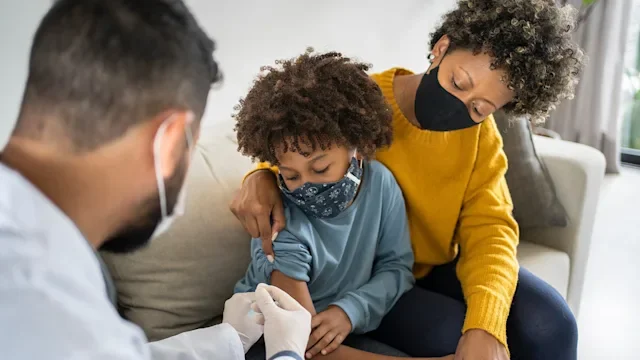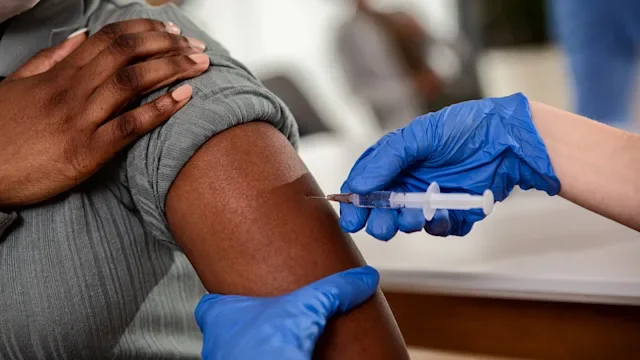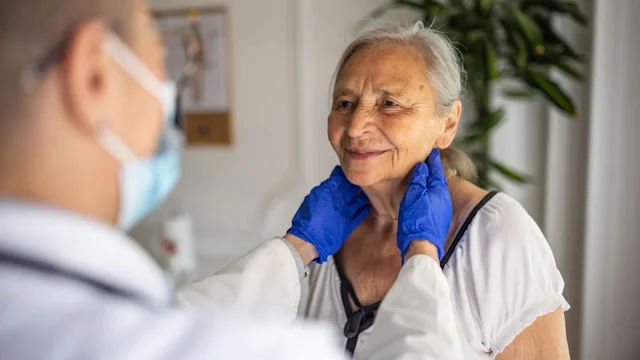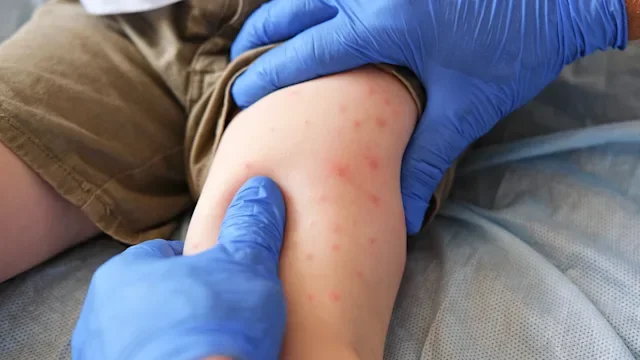Key takeaways:
The best way to prepare for your child’s vaccine visit is to talk with your child’s pediatrician in advance about their vaccine schedule. And learn which vaccines your child will get at each visit.
If you’re calm and prepared, then your child will be, too. Distraction and feeding are some of the ways to reduce pain during the shots themselves.
Most vaccine reactions are mild and resolve quickly. Allergic reactions to vaccines in children are very rare.
It’s never fun to think about your child experiencing pain. So it’s natural for parents to feel nervous about going for a vaccine visit. Learning about childhood vaccinations will help you feel more prepared. And the more relaxed you are, the more calm your child will be.
Here, we’ll cover some basic information about childhood vaccines, including when your child should get them, and how to care for your child before and after their shots.
How many vaccines should my child get?
Experts recommend 18 vaccines for children from birth to 18 years of age. Most vaccines need boosters so that a child can develop lifelong immunity. Some states also require certain vaccines before kids enter school.
The American Academy of Pediatrics recommends a vaccine schedule. This schedule helps each child get protected against a wide variety of illnesses in the most efficient way possible. For example, the pneumococcal vaccine (which helps prevent ear infections and pneumonia) is usually given at 2 months, 4 months, 6 months, and 12 to 15 months of age. Thankfully, combination vaccines exist to avoid needing too many shots at once.
The vaccines currently recommended for children from birth to 18 years of age protect against the following diseases:
Hepatitis A
Hepatitis B
Rotavirus
Haemophilus influenza type B
Diphtheria
Tetanus
Pertussis (whooping cough)
Pneumococcal conjugate
Inactivated polio
Measles
Mumps
Rubella
Varicella (chicken pox)
Human papillomavirus (HPV)
Meningococcal
Influenza (the flu)
COVID
Respiratory syncytial virus (RSV)
Seasonal vaccines: Flu, COVID, RSV
Some vaccines are recommended yearly. This is to help protect against seasonal viruses. For example, the flu vaccine is updated each year so that it can help protect against the specific viruses that are circulating that year.
Likewise, an updated shot for COVID is recommended so that your child has better protection against the latest circulating strains. Studies have shown that COVID vaccines are safe and effective in children. Experts recommend them for children 6 months and older.
The immunization schedule also includes a shot to help protect against RSV. Technically this is not a vaccine. It is an antibody that protects against disease. (Vaccines stimulate your body to create antibodies, while the RSV shot directly gives your body those antibodies). But it’s similar to a vaccine in that it’s given to help prevent RSV illness in younger children. This may be recommended for children 19 months and younger depending on their risk factors and age.
Read more like this
Explore these related articles, suggested for readers like you.
How do I prepare for the vaccine visit as a parent?
As a parent, preparing in advance can help you stay more comfortable during the visit. Here are some ways to get ready for vaccine day:
Find out the vaccine schedule in advance. Many doctors provide a handout with the expected vaccine schedule at a child’s initial visit.
Try to dress your child in clothing that provides easy access to their thighs or arms. Babies get the injections in their thighs, and older children get them in their upper arms.
Bring snacks or a treat for after the vaccines. If you have a younger infant, try to plan the visit around their feeding schedule so that they can breastfeed or bottle feed right after the shots.
Take a book your child can read. This will help distract them. You can also bring a favorite stuffed animal for comfort afterward.
Have someone come with you. If you’re worried that your nerves might make your child more anxious, consider bringing along another caregiver to stay with your child while they get their shots.
How do I prepare my child?
Here are some ways to help your child get comfortable in advance:
Play “doctor” with a toy doctor kit at home. Let your child trade off between being doctor and patient as you give each other shots. This works best for younger children.
Have them read a book or watch a video. Children of preschool age can benefit from watching the Daniel Tiger or Doc McStuffines episodes on getting a shot. Here are some book suggestions.
Answer questions honestly. Rather than saying, “It won’t hurt at all,” it’s better to say, “Well, you’ll feel a pinch and it might hurt a little, but it’ll be over very soon.”
Give them information. Some children benefit from knowing all the details in advance. But others might get more anxious thinking about the shots too soon. You know your child best! If they ask, “Will I get a shot?,” it’s OK to say, “We’ll have to ask the doctor tomorrow and see.”
Talk with your pediatrician. For an especially anxious child, it can help to plan ahead and have a conversation with their pediatrician to come up with a plan together to reduce anxiety.
How can I keep them calm during their shots?
Even if you’ve prepared for the appointment, your child might still be anxious once you’re in the doctor’s office. You can try these tips to keep them relaxed while they get their shots:
Try to stay calm yourself. Children naturally look to their parents to see how fearful they should be. Even if you’re nervous, it helps to project an air of calmness.
Give them something sweet. Studies have shown that sugar water can decrease a baby’s pain sensitivity. So feeding or nursing either during or just after vaccines can help ease any discomfort.
Distract them. This helps take the focus away from pain. For younger children, this might involve singing, watching videos, or blowing bubbles. For older kids, reading a book or doing a guided-imagery exercise can be helpful.
Ice or numb the area beforehand. For a child who is especially anxious, sometimes it helps to ice the area in advance. You can use numbing cream, or bring a Buzzy Bee — a handheld device that vibrates on the skin and decreases pain sensation.
Should I avoid giving my child medications before they get their shots?
Some studies suggest that giving children fever-reducing medications before vaccines can lower a child’s immune response. In these studies, giving anti-fever medications before the vaccines led to a reduced immune response to routine vaccines.
This is why experts no longer recommend giving acetaminophen (Tylenol) or ibuprofen (Advil, Motrin) before a child’s shots. And since most children don’t have any side effects, it’s also usually not necessary.
Can I give them Tylenol, Advil, or other painkillers afterward?
Yes. Those same studies showed that if you wait 6 hours after the shots to give anti-fever medications, they had no effect on the immune system. If a child develops a fever in response to their vaccines, it’s usually a sign that they’re already developing an appropriate immune response (and those symptoms usually show up more than 6 hours after the vaccine is given).
Pain relievers such as acetaminophen (Tylenol) or ibuprofen (Advil, Motrin) can be very helpful for relieving any discomfort after a shot and for treating a child’s fever. But, since plenty of children have no side effects with vaccines, it’s better to wait and see if they need any treatment before offering medication.
How many children have allergic reactions to vaccines?
Severe allergic reaction to vaccines is quite rare, typically in the range of 1 to 2 cases for every 1 million children. Allergic reactions usually occur in the first 4 hours after receiving the shot. Symptoms include:
Hives
Wheezing
Swelling of the face
Vomiting
If any of the above symptoms occur, get immediate medical attention for your child.
What to watch for after they get their shots
Most children have no side effects after vaccines. For children who do have reactions, most side effects resolve within 24 hours. But sometimes they can linger for a couple of days.
The most common side effects after vaccines are:
Fever
Muscle aches
Redness and soreness at the site of injection
Tiredness
Headache
Increased fussiness, or waking up more often at night (usually seen with younger children)
These are all signs of a healthy immune system and do not indicate an allergy to the vaccine. These symptoms mean that your child’s body is developing immunity as desired (although side effects are not necessary for developing immunity). Acetaminophen or ibuprofen can easily treat most of these side effects.
The bottom line
Vaccines are safe and lifesaving. They help protect your child from many diseases. And vaccines help ensure the health and safety of those around them. To keep your child calm during their shots, stay calm yourself and try distractions and sweets. To help with any discomfort or side effects after their vaccines, you can use over-the-counter medications such as Tylenol or Motrin.

Why trust our experts?


References
Centers for Disease Control and Prevention. (2019). Diseases & the vaccines that prevent them.
Centers for Disease Control and Prevention. (2023). Child and adolescent immunization schedule by age.
Centers for Disease Control and Prevention. (2023). Frequently asked questions about RSV immunization with monoclonal antibody for children 19 months and younger.
Children’s Hospital of Orange County. (n.d.). Guided imagery.
Chung, E. H. (2014). Vaccine allergies. Clinical and Experimental Vaccine Research.
Hu M., et al. (2023). Safety of the BNT162b2 COVID-19 vaccine in children aged 5 to 17 years. JAMA Pediatrics.
Pannell, N. (2016). 7 books to get your kid comfortable with getting vaccinated. Romper.
Scheifele, D., et al. (2018). Fever prophylaxis can reduce vaccine responses: A caution. Paediatrics & Child Health.
Taddio, A., et al. (2010). Reducing the pain of childhood vaccination: An evidence-based clinical practice guideline (summary). CMAJ: Canadian Medical Association Journal.
Wu, Q., et al. (2024). Real-world effectiveness of BNT162b2 against infection and severe diseases in children and adolescents. Annals of Internal Medicine.
Wysocki, J., et al. (2017). A randomized study of fever prophylaxis and the immunogenicity of routine pediatric vaccinations. Vaccine.

















